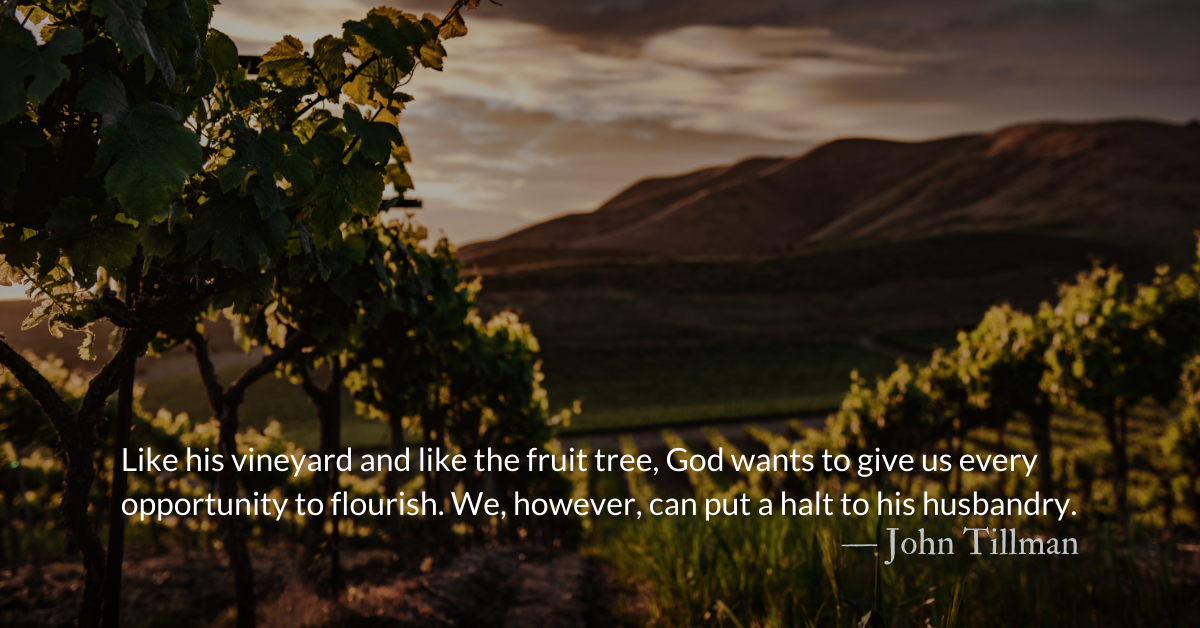Scripture Focus: Psalm 80.8-11, 14-18
8 You transplanted a vine from Egypt;
you drove out the nations and planted it.
9 You cleared the ground for it,
and it took root and filled the land.
10 The mountains were covered with its shade,
the mighty cedars with its branches.
11 Its branches reached as far as the Sea,
its shoots as far as the River.
14 Return to us, God Almighty!
Look down from heaven and see!
Watch over this vine,
15 the root your right hand has planted,
the son you have raised up for yourself.
16 Your vine is cut down, it is burned with fire;
at your rebuke your people perish.
17 Let your hand rest on the man at your right hand,
the son of man you have raised up for yourself.
18 Then we will not turn away from you;
revive us, and we will call on your name.
Reflection: The Ever-Patient Agriculturalist
By John Tillman
The psalmist compares Israel to a transplanted vine that is intended to bring the wine of God’s blessing to the world. Throughout the Bible, God is often pictured as an ever-patient agriculturalist.
God begins by planting a garden in which to place humanity. When tares are sown among his wheat, he delays judgment for the sake of his crop. He is a shepherd who seeks the lost sheep and gives his life for them. As the sower, he scatters seed even to soil others abandon. He is the oxen-driver who prepares a well-fitted and “easy” yoke for us. He is the orchard owner, giving his fruitless trees another year and every opportunity to flourish. He is a vinedresser, tenderly transplanting his vines from bad soil to good. He grafts in wild vines to join his true vine from which the blessings of wine will flow.
Israel was to become God’s representatives upon the Earth. They were to be set apart from the nations yet welcoming to all nations. Their holiness was not intended to condemn other nations but to call them out of the darkness. God uprooted and transplanted Israel out of Egypt. He saved them from the darkness of idolatry and from under the thumb of empire. But a little bit of Egypt stuck to their roots. Eventually, they would become as evil as the empire they were extracted from.
Like his vineyard and like the fruit tree, God wants to give us every opportunity to flourish. God desires that we be placed, planted, protected, preserved, and made productive by him. We, however, can put a halt to his husbandry. Our soil can resist his seed. Our roots can refuse his tending. Our branches can frustrate him with our fruitlessness. We can uproot in our hearts what he plants, replanting our own idolatrous crop of greed, lust, and anger.
Eventually, God will till under fruitless vineyards. Eventually, fruitless trees will be cursed and cut down. Eventually, our tares will be separated from our wheat and burned. We will experience both God’s justice and his grace.
We can participate in this process of sanctification now, becoming a partner to our own cleansing, tilling under our own sinful crops, and enabling a rebirth of fruitfulness.
The purpose of deconstruction is reconstruction.
The purpose of uprooting is to replant.
May we rejoice in being pruned and replanted.
Divine Hours Prayer: The Request for Presence
Teach me your way, O Lord, and I will walk in your truth; knit my heart to you that I may fear your Name. — Psalm 86.11
– From The Divine Hours: Prayers for Summertime by Phyllis Tickle.
Today’s Readings
Micah 2 (Listen 2:11)
Psalm 80 (Listen 1:58)
Read more about The Cultivating Life
We have written before “cultivation is supernatural,” but the simple actions of cultivating faith are not ethereal or fanciful. They are the practical, steady doings of the farmer.
Read more about Cultivation Is Supernatural
Cultivation is not natural. It is supernatural. We give plants a safer, healthier place to grow than exists naturally, and they give us better food in greater quantities.








